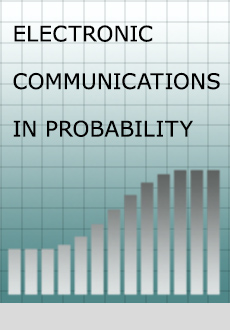Abstract
Markovian growth-fragmentation processes describe a family of particles which can grow larger or smaller with time, and occasionally split in a conservative manner. They were introduced in [3], where special attention was given to the self-similar case. A Malthusian condition was notably given under which the process does not locally explode, in the sense that for all times, the masses of all the particles can be listed in non-increasing order. Our main result in this work states the converse: when this condition is not verified, then the growth-fragmentation process explodes almost surely. Our proof involves using the additive martingale to bias the probability measure and obtain a spine decomposition of the process, as well as properties of self-similar Markov processes.
Citation
Jean Bertoin. Robin Stephenson. "Local explosion in self-similar growth-fragmentation processes." Electron. Commun. Probab. 21 1 - 12, 2016. https://doi.org/10.1214/16-ECP13
Information





